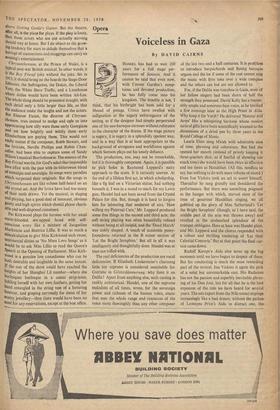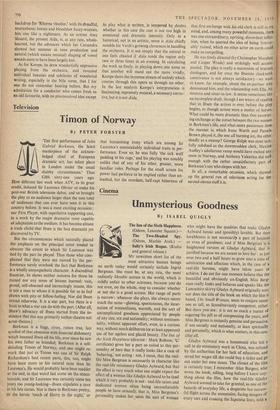Voiceless in Gaza
By DAVID CAIRNS HANDEL has had to wait 200 years for a full stage per- formance of Samson. And it cannot be said that even now, with Covent Garden's sump- tuous and devoted production, he has fully come into his , kingdom. The trouble is not, I think; that his birthright has been sold for a Messel of potage. Critics have swelled with indignation at the sugary extravagance of the setting, as if the designer had simply perpetrated one of his neo-baroque excesses without reference. to the character of the drama. If the stage picture is sugary, it is sugary in a splendidly opulent way, and in a way that is at least appropriate to the background of arrogance and worldliness against which Samson plays out his lonely defiance.
The production, too, may not be remarkable, but it is thoroughly competent. Again, it is possible to pick holes in Raymond Leppard's natty approach to the score. It is certainly uneven. At the end of a lifeless first act, in which scholarship, like a fig leaf on a Victorian statue, had nothing beneath it, I was in a mood to reach for my Lewis gun; Handel had not been saved from the Crystal Palace for this. But, though it is hard to forgive him for labouring that tenderest of airs, 'How willing my Paternal Care,' Mr. Leppard produced some fine things in the second and third acts; the soft string playing was often beautifully refined without being at all insipid, and the `Dead March' was nobly shaped. A touch of academic pussy- footedness returned in the B minor section of let the Bright Seraphim.' But all in all it was intelligently and thoughtfully done. Handel was at least not trifled with.
The real deficiencies of the production are vocal deficiencies. If Elisabeth Lindermeier's charming little toy soprano is considered unsuitable for Gutrune in Gotterdammerung, why foist it on Dalila? Apart from anything else, such casting is rankly unhistorical. Handel, one of the supreme melodists of all times, wrote, for the sovereign power and richness of the human voice, music that uses the whole range and resources of the voice more thoroughly than any other composer of the last two and a half centuries. It is profitless to introduce harpsichords and fluting baroque organs and the lot if some of the cast cannot sing the music with firm tone over a wide compass and the others can but are not allowed to.
For, if the Dalila was voiceless in Gaza, most of her fellow singers had been shorn of half the strength they possessed. David Kelly has a reason- ably ample and sonorous bass voice, as he testified a few evenings later as the High Priest in Aida. Why keep it for Verdi? He delivered 'Honour and Arms' like a whispering baritone whose modest natural gifts have been scientifically wizened to the dimensions of a dried pea by three years in the Royal College of Music.
Lauris Elms sang Micah with admirable ease of tone, phrasing and coloratura. But had she opened her mouth (instead of primly keeping it three-quarters shut, as if fearful of showing too much tone) she would have been twice as effective and ten times as Handelian. (All this, needless to say, has nothing to do with mere volume of sound.) Even Jon Vickers took an act to assert himself. Thereafter he sang grandly and shouldered the performance. But there was something poignant in the hunger with which, starved most of the time of generous Handelian singing, we all gobbled up the glory of Miss Sutherland's 'Let the Bright Seraphim' (though, as I have said, the middle part of the aria was thrown away) and revelled in the unsheathed splendour of the trumpet obbligato. Here at least was Handel plain, and Mr. Leppard and the chorus responded with a robust and thrilling rendering of 'Let their Celestial Concerts.' But at that point the final cur- tain came down.
Rudolf Kempe's Aida also saves up the big' moments until we have begun to despair of them. But his 'conducting is much the most rewarding part of the revival. Jon Vickers is again the pick of a solid but unremarkable cast. His Radames has not the passion and superbly inevitable phras- ing of his Don Jose, but for all that he is the best exponent of the role we have heard for several years. The sets (apart from the Nile scene) impinge increasingly like a bad dream; without the pathos of Leontyne Price's Aida to distract one, the backdrop for 'Ritorna vincitor,' with its dreadful, neurasthenic horses and bloodshot fuzzy-wuzzies, hits one like a nightmare. As an actress Amy Shuard, the present Aida, is, at any rate, whole- hearted, but the advances which her Cassandra showed last summer in tone production and natural (which means musical) shaping of vowel sounds seem to have been largely lost.
As for Kempe, he drew wonderfully expressive playing from the orchestra, and revealed individual beauties and subtleties of woodwind writing, especially in the Nile scene, that I for one do not remember hearing before. But my admiration for a conductor who comes fresh to an old favourite, with no preconceived idea except to play what is written, is tempered by ,doubts whether in this case the cost is not too high in emotional and dramatic intensity. Only in a historical, not in an artistic, sense is Aida chiefly notable for Verdi's growing cleverness in handling the orchestra. It is not simply that the animal in one feels cheated if Aida rends the region only two or three times in an evening. In calculating the work so finely, in playing down one scene so that another will stand out the more vividly, Kempe dams the immense stream of melody which courses through this opera as through no other. In the last analysis Kempe's interpretation is, fascinating, supremely musical, a necessary correc- tive, but it is not Aida.































































 Previous page
Previous page